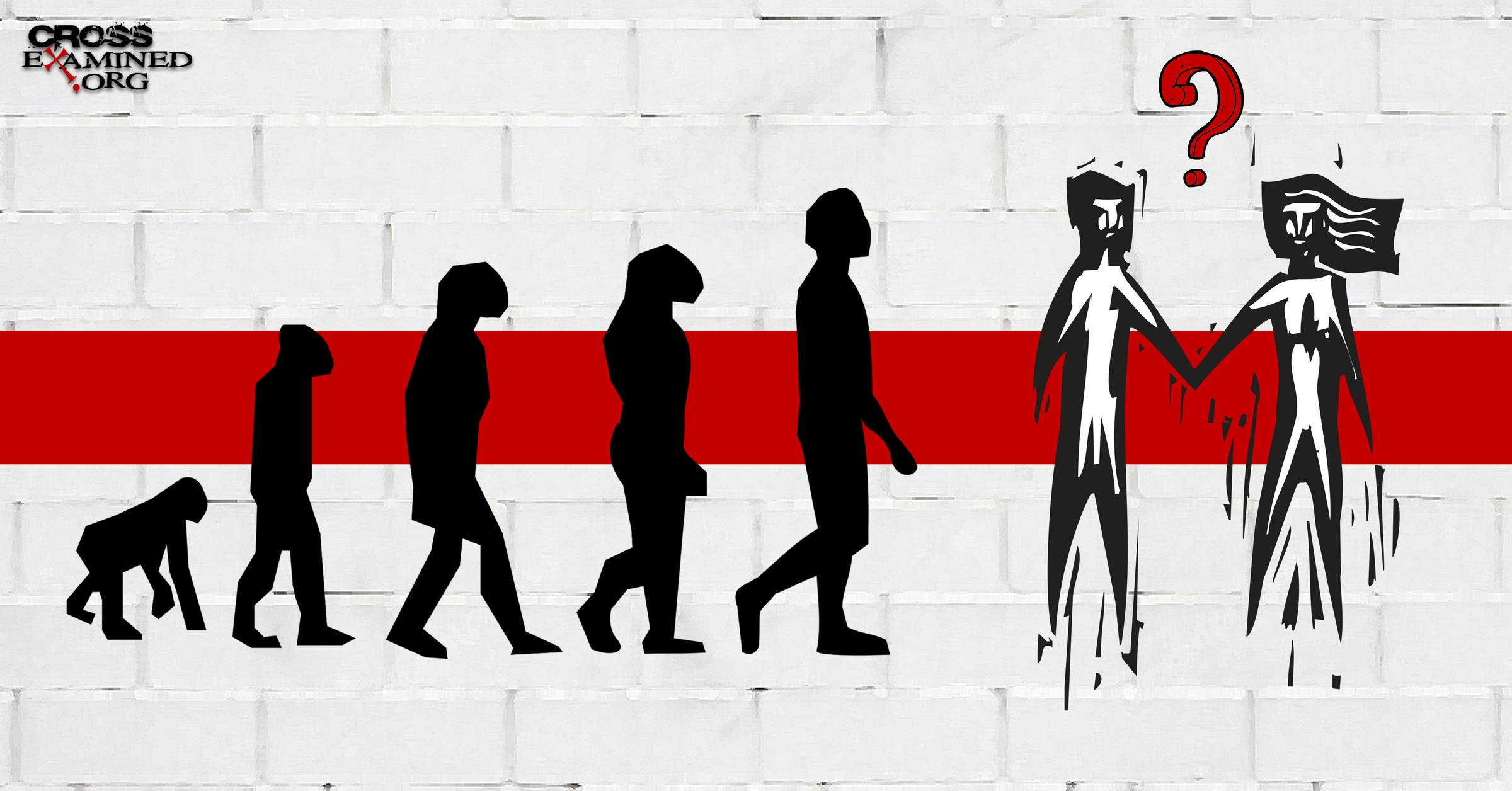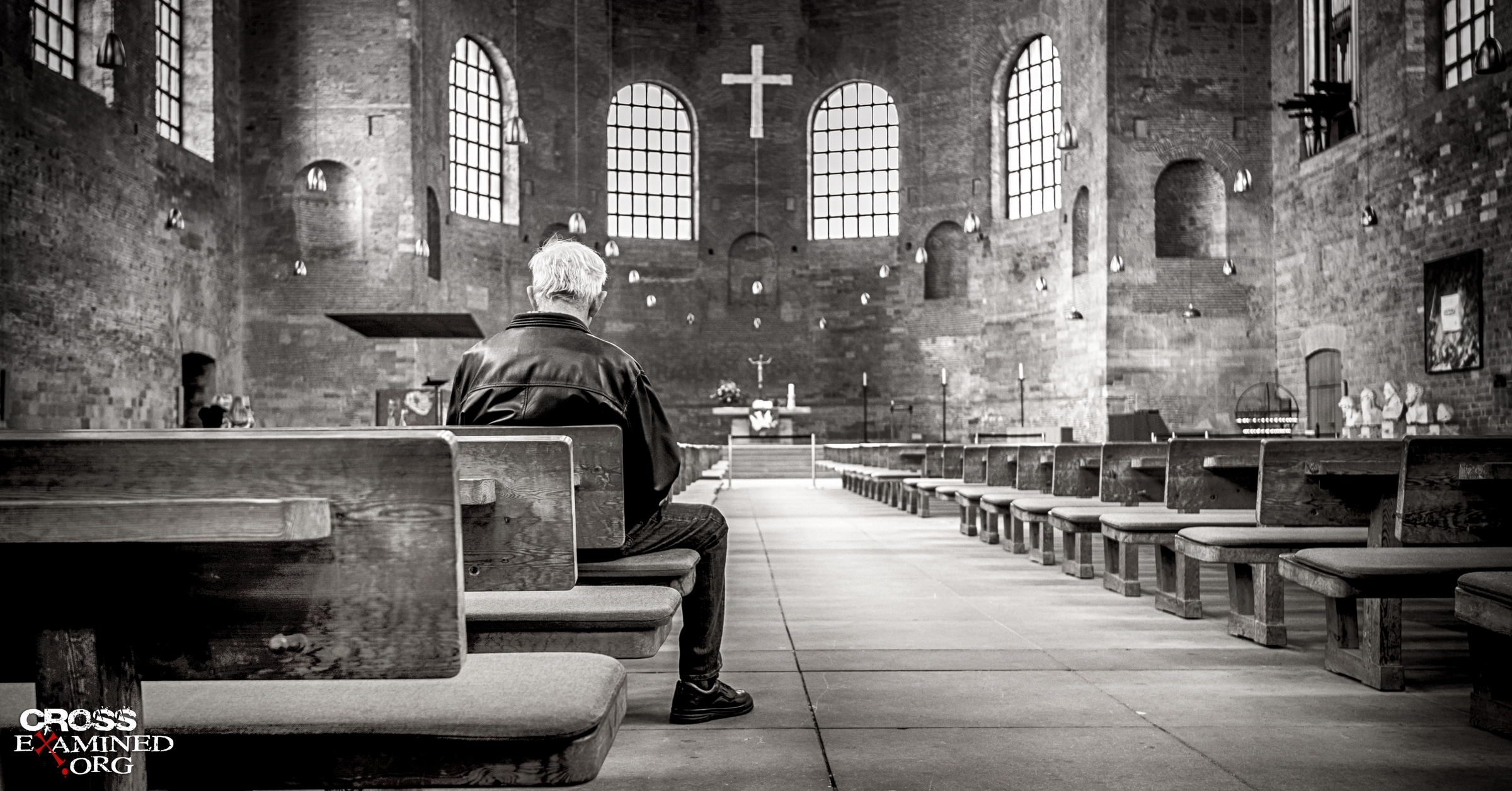By Evan Minton
If evolution were true, what would we Christians do about the Bible’s teachings on Adam and Eve, their relationship with sin’s entrance into the world, and the doctrine of original sin? As I’ve argued in several blog posts on this website, I believe Christianity and Evolution are compatible, and many of the objections lodged at Theistic Evolution simply don’t work. For example, when scientists talk about “random” mutations, they don’t mean the mutations are purposeless or chance events. They just mean that they’re unpredictable from a scientific point of view[1], and in any case even if they did mean they occurred by chance, this would at most, only be from a human perspective. Proverbs 16:33 says “The lot is cast, but it’s every decision is from the Lord.” So the argument that evolutionary creationism is incoherent because “it posts that God had a purpose in a random process” commits the fallacy of equivocation. God is sovereign even over what appears to be a chance event from our human point of view. Also, just because an event can be explained naturally by no means entails that God wasn’t involved. We believe (and The Bible teaches) that God orchestrated the crucifixion of Jesus, but He clearly worked through natural processes (i.e human free choices) to bring that about. Moreover, as Kirk MacGregor has argued, Molinism would provide a plausible mechanism for how God could guide evolution without intervening all the time.[2]
All that said, I think the trickiest area that Theistic Evolution a.k.a Evolutionary Creationism has to deal with is the biblical teachings on Adam and Eve. For those who reject macroevolution entirely, such as young earth and old earth creationists, Adam isn’t a problem. But what about those convinced of Evolutionary Creationism? What if you become convinced that the scientific evidence firmly establishes macro evolution? Some say that evolution doesn’t allow for a historical Adam at all, and therefore, would adopt an allegorical interpretation of Genesis 1-11 and say that biblical history starts in Genesis 12 (e.g Peter Enns). As I’ve written elsewhere, I think an allegorical view of Genesis is exegetically untenable. If nothing else, it makes Romans 5 unintelligible, and it renders the Genealogies in Luke and 1 Chronicles errant.[3]
While it’s true that an evolutionary process wouldn’t result in the genesis of one man and one woman, it doesn’t follow that Genesis 2-11 need to be entirely jettisoned as historical narrative. I’m convinced that there are least two biblically faithful options we could adopt if we thought the theory of Darwinian macro evolution were true. These would harmonize evolutionary biology with the biblical text. There are more than Christian evolutionists have proposed, but in this blog post, I’ll only survey the ones I think are the most tenable and have the least amount of problems.
1: The Strattonian Model
In his blog post “Should Christians Oppose Evolution?” apologist and blogger Tim Stratton offers the following evolutionary creation model.
“1. God exists and possesses omniscient middle knowledge.
2. Big Bang (God chooses and actualizes this world and all that will happen in it)!
3.The universe unfolds…
4. Our solar system and earth come into existence.
5. Life evolves exactly the way God knew it would via his design in the finely-tuned initial conditions of the Big Bang.
6. Homo sapiens evolve as planned (not by accident).
7. God “breathes his image” (soul) into the Homo sapien making the first human in another act of special creation.
8. God does the same thing with a female Homo sapien and then “breathes his image” into her making the first female human.
9. God separates Adam and Eve from the other “soul-less” Homo sapiens (who are physically identical, but not spiritually), and places them in the Garden of Eden with the Tree of Life (as long as they eat of this tree they will never experience a physical death).
10- After the fall, Adam and Eve are expelled from the paradise of the Garden of Eden and the Tree of Life (now they will eventually die).
11. After Adam and Eve’s son, Cain, kills their other son, Abel, Cain is expelled from the world’s only “human tribe.” Cain is scared of other soul-less Homo sapiens who may kill him (Genesis 4:13-14).
12. Cain finds a physically identical but soul-less Homo sapien female as a wife (Genesis 4:17). The human soul is always passed on to offspring (avoids “bottle-necking” problems).
13. The human soul is a trait preferred via natural selection (as it allows for rationality).
14. Soon, all Homo sapiens have souls created in the “image of God.” Therefore, now all Homo sapiens are human (All humans are Homo sapiens, but not all Homo sapiens have been human).
15. This is exactly the way God planned and designed life to unfold. It all started with the Big Bang!” [4]
The most controversial and most important part of the model is 8-14. This is because it deals with the origin of humanity and the historicity of Adam and Eve. Stratton proposes that a few thousand homo sapiens evolved in the “March Of Progress” (step 6), and God elected to supernaturally intervene to endow one specific homo sapien with a spirit (i.e His image, entailing rationality, free will, and the knowledge of objective morality) (step 7). This homo sapien, He named Adam. Then God did the same thing with a female Homosapien (step 8), whom Adam named Eve when he first met her. Step 9 of Stratton’s model posits that the other homo sapiens were not supernaturally endowed with His image, and therefore remained spiritless like all of the other animals in the world. If you’re having a hard time imagining this, think of the unintelligent, mute humans in the movie “The Planet Of The Apes” (the original one with Charlton Heston). While George Taylor was an intelligent, rational being endowed with free will and a knowledge of right and wrong, the other homo sapiens he encountered had devolved into unintelligent animals, and the apes in the movie (who had now gained intelligence and rationality) treated them as such.
Steps 10-12 of Stratton’s model posits that once exiled from the Garden of Eden because of their disobedience, Adam and Eve had other children, and once Cain fled the scene of the crime, the wife he found was one of these spiritless homo sapiens, whom he was able to reproduce with since they were physically identical. Over time, the divine image bearing homo sapiens replaced the non-divine-image bearing once because natural selection preferred the former because greater intelligence provided for better survival.
Step 12 of Tim Stratton’s model is helpful since it posits that Adam’s offspring reproduced with spiritless homo sapiens. This would provide enough genetic diversity by the time of the Genesis flood (chapters 6-9) so that, although all people are inherited from Noah and his sons (who, in turn, were descended from Adam and Eve), we don’t run into the “But much population genetics!” objection. All people are descended from two humans, Adam and Eve, despite evolution bringing about a large number of homo sapiens.
When I first read about this model many months ago, I really liked it. One thing that bothered me about it is that it posits that Adam’s descendants mated with non-human (i.e non-imageo dei) homo sapiens. This seems to get dangerously close to saying beastiality occurred, because although they were biologically identical to the image bearing homo sapiens (Adam, Eve, Cain, Able,) they were animals on a spiritual level. But as I reflected on it, I became more comfortable with it. First, even if this was technically beastiality, is that really any worse than the traditional explanation that Adam’s children all had sex with each other? Also, many Christians are trichotomous in their view of the human soul. So, to say that God could have created a human body with a soul but not a spirit (i.e the divine image) shouldn’t bother them. Since the spirit is a separate faculty altogether, I don’t see why God couldn’t withhold this faculty from all except Adam and Eve and the children they bore. And even on dichotomism (the view I gravitate towards), the Spirit is a faculty of the soul even though it isn’t a separate faculty altogether. To be a truly human person, one is biologically homo sapiens and is endowed with a spirit-soul. Why couldn’t there homo sapiens endowed with souls that lacked the property? Creatures, that are human in biology only?
Tim Stratton, after presenting this model, went on to stress that he isn’t saying this model of creation is true. In fact, he wasn’t even arguing that evolution is true. Rather, he’s presenting this model as a possibility to show that macro evolution and Genesis 1-11 being historical accounts are not mutually exclusive affirmations. There is a logically possible way that both can be true. Therefore, if one is convinced of The Bible, one does not have to throw out evolution. If one is convinced of evolution, that is no cause to throw out The Bible. This model shows it’s logically possible for both Darwinian macro evolution to be true and for the historical accounts in Genesis to be true.
Evolution does nothing to undermine the inerrancy of The Bible and Christians have nothing to fear if they start thinking that Darwin’s theory has something to it.
In order to show evolution refutes Genesis (or vice versa), one would have to show that Tim Stratton’s model cannot even be possibly true.
2: The Evolutionary Ancestral Pair Model
Some have argued that even presupposing the truth of Darwinian Macro Evolution, it is defensible to suppose that by the time homo sapiens evolved, something happened to render us a bottleneck of only two individuals. Individuals who evolved but are nevertheless the only remaining members of their kind. They would rebut geneticists who say that genetic evidence forces us to say that the bottleneck of ancient homo sapiens was no larger than 10,000, citing studies showing genetic diversity coming from one male animal and one female animal that exceeded the expectation of the scientists who put the two animals together.
Biochemist Fasale Rana writes of one study involving two sheep that were left together on a deserted island. He wrote:
“In 2007 a research team reported on the genetic diversity of wild mouflon sheep on one of the islands that are part of the Kerguelen sub-Antarctic archipelago. This group of sheep provided researchers with an unprecedented opportunity to study the effects of population dynamics on genetic diversity in small populations.
In 1957 a male and female yearling were placed on Haute Island (an island in the Kerguelen Archipelago). . . . By the beginning of the 1970s, the number had grown to 100 individuals and peaked at 700 sheep in 1977. Since that time the population has fluctuated in a cyclical manner between 250 and 700 members.
Given that the population began with only two individuals, . . .has experienced cyclical changes in the population size, and was isolated on an island, the researchers expected very low genetic diversity (measured as heterozygosity).” [5]
However, when the scientists measured this quantity directly for the sheep on Haute Island, they discovered that it exceeded the predictions made by the models by up to a factor of 4. The genetic diversity exceeded the expectations of the model four times over! They greatly underestimated what the genetic diversity of the actual population was going to be.
It’s important to point out that Fasale Rana accepts De Novo Creation rather than Evolutionary Creation. It’s also important to point out that these findings don’t disprove macroevolution nor do they prove all humanity actually came from one man and one woman. The findings do, however, make defensible the doctrine that all humanity descended from one man and one woman.
Perhaps we all descended from Adam because he was the only homo sapiens left by the time of homo sapiens’ evolution. Perhaps some catastrophe wiped out the other homo sapiens by this time. That would make it necessary for God to miraculously fashion another human from Adam’s side. Upon seeing Eve, Adam was relieved to find that there was another human being, whom he could mate with to restore the species (Genesis 2:20-23).
Or, perhaps Adam and Eve were one pair among several thousand at the dawn of humanity, and the reason why we’re all descendants of him is that we’re all descendants of Noah, and only Adam’s lineage survived the flood through Noah. If the population genetics argument is as faulty as Rana says, no objection could be raised at a bottlenecking during the time of Noah’s Ark.
However, if population genetics are reliable after all, there still wouldn’t be a problem. We could merely adopt Tim Stratton’s model, which, as I said, would entail that Noah and his sons had much genetic diversity within them, given that Adam’s children mated with spiritless homo sapiens. The flood could very well explain why these spiritless homo sapiens vanished from the Earth and only the imageo dei baring ones lived on.
Objection: But Genesis 2 says Adam was made from Dirt, and Eve from his side!
Some special creationists would object that although these models would keep Adam and Eve as historical individuals within an evolutionary framework, nevertheless, the biblical description of their creation precludes them being evolved from lower hominids. Genesis 2:7 says that God made Adam from the dust of the ground and Genesis 2:21-22 says Eve was fashioned from Adam’s side. If that doesn’t sound like de novo creation, I don’t know what does. Doesn’t this rule out human evolution entirely?
I don’t think so. First, while I’m open to these descriptions being literal, I’m also just as open-minded toward a non-literal reading of these passages. Just because a text is a historical narrative doesn’t mean every word within the narrative has to be taken literally. If that were the case, then when Jesus said “I am the gate” (John 10:9), we’d have to conclude he’s literally a gate with hinges. The gospels are clearly Greco-Roman biographies (a specific kind of the historical genre), yet Jesus frequently spoke in metaphorical language.
Old Testament Scholar John Walton proposes a metaphorical reading of the “dust from the ground” and “from Adam’s side” language in his book The Lost World Of Adam and Eve.
John Walton makes a strong case that the reference to dust is implying Adam’s mortality, given other places in Scripture where it speaks of humans being dust, with the context making it clear that the “dust” language is speaking of our mortality. Psalm 103:13-16 says “As a father has compassion for his children, so the Lord has compassion for those who fear him. For he knows how we were made; he remembers that we are dust. As for mortals, their days are like grass; they flourish like a flower of the field; For the wind passes over it, and it is gone, and its place knows it no more.”
We are dust. We are mortal. Just like the grass and flowers.
The “teacher” of Ecclesiastes asserts the same thing, comparing us to animals:
“The fate of humans and the fate of animals is the same; as one dies, so dies the other. They all have the same breath, and humans have no advantage over the animals; for all is vanity. All go to one place; all are from the dust, and all turn to dust again.” – Ecclesiastes 3:19-20
It’s very plausible that the Genesis text is just saying God created Adam mortal, rather than literally scooping up a handful of dirt and miraculously transforming it into a person. It’s also possible that the language of Eve being created from His side is to convey the fact that women are ontologically equal to men.
“But wait!” you’ll object. “Doesn’t The Bible make it clear that Adam was created immortal? Romans 5 says death came into the world through his sin.” — For one thing, I think it’s plausible that Romans 5 is speaking of spiritual death, not physical (see my blog post “Why Pre-Fall Death Isn’t A Problem For Old Earth Creationism” to see why). But besides that, if Adam was created mortal, then the tree of life becomes superfluous. For if Adam was an inherently immortal being until he sinned, then why does there need to be a tree of life for him to eat from? And why did God feel the need to bar access from the tree of life? In Genesis 3:22, God told us the reason for barring access to the tree of life. “And the LORD God said, ‘The man has now become like one of us, knowing good and evil. He must not be allowed to reach out his hand and take also from the tree of life and eat, and live forever.”God barred access to the tree of life to prevent Adam and Eve from living forever. But if they were inherently immortal, such a tree wouldn’t be needed. It’s implied that unless Adam and Eve could have regular access to the tree of life, they would die, which entails they didn’t have immortality in and of themselves.
Moreover, we should also keep the principle of accommodation in mind. As I’ve argued in Part 3 of my series on biblical hermeneutics and in “Why Did God Write A Book?”, I don’t believe it was God’s intention to teach the original recipients of scripture scientific truths. God used the faulty science of their day to convey spiritual and theological truths. If that’s the case, then Genesis 2-3 shouldn’t even be treated as a text on anthropological origins even in principle.
Objection: Genesis Doesn’t Say Anything About Other Humans Coming Into Existence Simultaneously with Adam and Eve.
Some may object that any evolutionary creationist view that takes Genesis 1-11 as historical is untenable because Genesis 2-3 is silent on the creation of other humans. Since The Bible doesn’t say anything about these other thousands of humans at the dawn of our species, it is eisegesis to say that Adam and Eve were only one couple among thousands.
The problem with this objection is that it commits the Argument From Silence fallacy. True, The Bible doesn’t mention any other humans at the dawn of our species except for Adam and Eve, but that doesn’t necessarily mean they weren’t there. It’s possible that The Bible simply omits any omission of them because they aren’t important in the narrative. This is especially the case if Tim Stratton’s model is true. On Stratton’s model, these would be homo sapiens of an animalistic nature. They would be human in biology only, not baring the imago dei, which is the direct focus of Genesis 2; this image-bearing creature getting to know his Creator and getting the privilege to name all the animals (a privilege we still enjoy today when scientists discover a new species or star). Hugh Ross, who does not affirm evolutionary creationism, agrees that Genesis 2 is concerned with the spiritual origins of humanity whereas Genesis 1 is concerned about the physical origins.
It would also make sense of scripture to zero in on Adam if he is truly the man whom all humanity is descended from. On Stratton’s model, natural selection got rid of the non-spiritual humans since the intelligence associated with the imago dei contributed to survival value. Also, it could be the case that even if all homo sapiens had the imago dei, we could all still share Adam as our first parent since only his lineage survived the flood (i.e through Noah and his sons). This would also make Adam and Eve of special significance, and therefore it would make sence why the Genesis narrative focuses on them and ignores everyone else.
Moreover, if one affirms a “Federal Headship” view of Adam, it makes, even more, sense why Genesis would be silent about these other humans. Adam is their tribe leader and Eve is his wife. He’s the one responsible, on this view, for getting humanity into this sin situation, to begin with. Just as nations were held responsible for the sins of their kings, the rest of the human race were held accountable for what their chief leader (Adam) did. This is not a view I’ve examined in this post, partly because of length concerns, but also because I find problems with the inherited accountability brand of original sin, but this view is talked about in Loren Haarsma’s article linked below. I only bring it up because this model would also make sense of why Genesis only mentions one couple.
My philosophy has always been that when The Bible is silent on the matter, we’re free to speculate and/or look to other sources of knowledge to come to a conclusion. Genesis doesn’t really say that Adam and Eve were the only people God created at that time. This conclusion was inferred from (A) the lack of mention of other persons in the account and (B) the fact that Paul says every nation was built from one man (Acts 17:26), and (C) it has typically been held that the sinful nature was inherited from Adam a la Romans 5. But as we’ve seen, B is accounted for if only Adam’s lineage survived; either through natural selection or the Noah’s Ark flood. Thus Paul’s statement in Acts 17 would be true. As for C, it’s never explicitly stated that the sinful nature is inherited. This was an inference made by St. Augustine.
It could be that Adam spread sin to the entire human race in two ways; one through inheritance, and the other through bad influence. The latter would only apply to Adam’s contemporaries.
I would also like to point out that positing other humans created alongside Adam and Eve is not without historical or exegetical precedent. I remember reading a BioLogos post which mentioned that even before Darwin’s theory was even published, some theologians has speculated that perhaps God created other people alongside Adam and Eve. Their reason? To explain how human civilization sprung up so rapidly in Genesis 4 and to explain how Cain got his wife without having to invoke the incestuous explanation. I think this is significant, as these theologians weren’t trying to reconcile The Bible’s account of human origins with the evolutionary account (there wasn’t even an evolutionary account yet). They were trying to explain some anomalies that immediately followed the expulsion from the Garden of Eden.
Conclusion
There are many more models of evolutionary creationism that preserve a historical Adam that I could have surveyed, but I find these two to be the most faithful to the biblical text and have the least amount of exegetical and scientific difficulties. For other EC views on the historical Adam, check out this blog post written by Loren Haarsma.
In conclusion: Evolution is not a threat to Christianity. It is not only is compatible with theism, it’s compatible with The Bible. True, evolution would alter the way we read the accounts of Adam and Eve’s formation, but it wouldn’t force us to deny their existence altogether. Therefore, even if evolution is true, we’re not forced to deny the historicity of The Bible’s opening chapters. If we are convinced the biblical authors intended for us to take Adam and Eve’s story as history and if we’re also convinced of macro evolution, these models are welcome alternatives to the allegorical approach.
Also, keep in mind that these two models are only put forth as possibilities, to try to show compatibility between the biblical account and evolution. As Tim Stratton recently said in a Facebook comment, it’s good to “have a model of Theistic Evolution in your ‘back pocket'” so you can immediately stop Darwin from being a roadblock to people coming to the cross, whether you personally think TE is true or not.
One thing is certain: God inspired two books: the book of The Bible and the book of nature. Since He is the author of both, neither can contradict one another. If there appears to be conflict, it’s because we human interpreters got it wrong somewhere. We either misread The Bible, or we misread the universe. Either the theologian got it wrong, or the scientists did. We must be careful to consider which.
Notes
[1] Scientists and Christians Deborah and Loren Haarsma explain in their book Origins: Christian Perspectives On Creation, Evolution, and Intelligent Design. They write:
“When scientists say that something is random, they mean that the outcome is unpredictable. Consider the roll of a pair of dice. Scientists can calculate the probability that the roll will yield a five or an eleven, but they can’t predict what any particular roll will turn out to be. It’s not that some mysterious force is at work making the dice roll differently each time. Rather, each time the dice are rolled they follow exactly the same well-understood natural laws of gravity and motion. The dice land differently each time because of how they bounce and spin. If the dice are tossed even slightly differently from one time to the next, that slight difference is magnified by each bounce, and after several bounces the final outcome is completely changed. The system is scientifically random because the outcome is unpredictable.”
[2] See Kirk MacGregor’s paper “The Impossibility Of Evolution Apart From A God With Middle Knowledge”. I also talk about this in my own words in my blog post “Could God Not Use Evolution Because It’s A Random Process” and “5 Reasons Why I’m Open To Theistic Evolution”.
[3] See my blog post “Why I Don’t Accept The Allegorical View Of Genesis”.
[4] Tim Stratton, “Should Christians Oppose Evolution?”, Free Thinking Ministries, October 18th, 2016, http://freethinkingministries.com/should-christians-oppose-evolution/
[5] Fazale Rana, “Were They Real? The Scientific Case for Adam and Eve,” Reasons To Believe, October 1, 2010. See http://www.reasons.org/articles/were-they-real-the-scientific-case-for-adam-and-eve
Original Blog Source: http://bit.ly/2EEZArA










